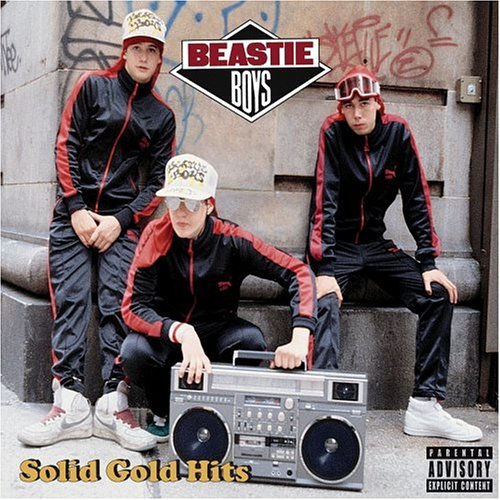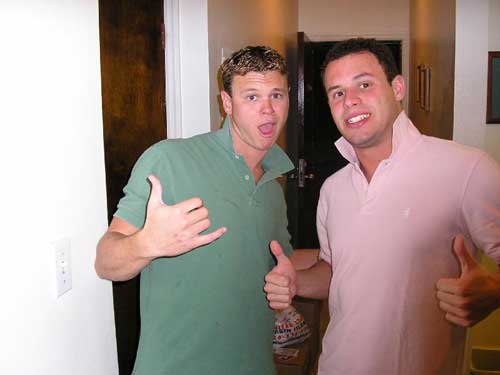Almost 25 years have elapsed since the Rick Rubin-helmed, Licensed to Ill found the Beasties staking their claim as the first major rap group to incorporate guitar-hero rawk (“Rock Box” aside). Such juxtaposition seems prosaic today, but it’s almost impossible to grasp how revolutionary sampling Led Zep, The Clash, and Sabbath once seemed—and that was just on the first track, “Rhymin’ and Stealin.”
Throughout their career, the Beasties have been unfairly maligned as ciphers manipulated by mastermind collaborators–from Rubin, to the Dust Brothers and Matt Dike, to the Dalai Lama (dude is lights out on the wind chimes)–an assumption that trivializes their abilities. Do you know how hard it is for ex-Bar Mitzvah’s to be that good at rapping? It’s on some Augean labors type shit. Trust. But beyond the peerless discography, including three classics (Check Your Head, Paul’s Boutique, Licensed to Ill, two very good albums (Ill Communication and Hello Nasty) and one post 9/11 aberration that no one shall mention by name, the Beasties remain the gold standard of rap-rock fusion.
Legions of rappers, black and white alike, have tried to replicate the Beastie formula, but until now, none have ever come close. There’s a spate of explanatory hypotheses–the most obvious being that up until a few years ago the Beasties were very much relevant (and still might be, depending on new album, Tadlock’s Glasses). Sure, they influenced practically every cracker to ever pick up a mic, from Hot Karl, Lexicon, Northern State, and MC Paul Barman, to the rap-rocktards, to nerdcore, to Princess Superstar and Peaches--all well and good, except that none of them were any good.
Asher Roth: Better Than Barman
If anything, Limp Bizkit, ICP, Korn et. al demonstrated the tenuous but tangible divide between class clown versus class dunce. What the Beasties’ merry prankster laissez faire masked was a subtly prodigious talent (perhaps the only thing subtle about them). Originally a hard-core outfit who opened for Bad Brains, the Dead Kennedys, and the Misfits, the trio held down the punk dictum that you don’t need to be able to play your instruments to be a great musician.
Take a song like “Sabotage,” and note how it showcases their ability to meld bloody-nose hardcore guitars, to adenoidal screech-raps, to Visigoth drums. Shit was proto-M.O.P., conceived by scrawny Hebrews, and it absolutely knocked. Somehow.Their background allowed them to understand how to make music capable of splitting the difference between KROQ and Power 106, unlike guys like B.o.B., Lil Wayne, who think adding a water-logged funk outfit makes you wail.
With eclecticism the prevailing cliche, it’s only logical that three of the next generation’s most prominent acts, Cool Kids, Asher Roth, and the Knux are lining up for the throne. The former describe themselves as the “black version of the Beastie Boys,” and lift the spare 808-heavy minimalism and pass-the-mic interplay of Licensed to Ill. Whereas most duos from the mid-90s on, divide their into raps into me-first 16 bar verses, the Cool Kids rarely go four without trading off. Since neither Mikey Rox nor Chuck Inglish are about to win a Scribble Jam any time soon, the seamless interplay helps mitigate their mutual shortcomings and lend a nostalgic charm to their music.
Asher Roth: Rap Music For People Who Don’t Listen to Rap Music
Asher Roth‘s schtick also cannily re-appropriates Licensed to Ill, not through sonics but through schematics. From the John Belushi aping College Sweaters, to the “look ma! no pigment schtick,” to the savvy decision to sample Weezer, if everything about Roth seems carefully calculated to appeal to white non-rap fans, it’s because it is. Roth’s rise has been subject to rife blogosphere conspiracy theories, but in reality it’s pretty simple. Managed by Scooter Braun, one of the most connected dudes in the industry, Roth’s success stems from that most trite axiom: it ain’t what you know, but who you know.
With Braun and Roth able to get co-signs from everyone from DJ Drama and Don Cannon, to Cee-Lo and Busta Rhymes, the largest stigma–getting people to take a young Woody Allen look-a-like seriously as a rapper–was instantly overcome. From day one, Roth’s people have followed him around with cameras, capturing any chance meeting with a member of hip-hop’s elite, and sending it to bloggers within hours. Add that to a deal with Steve Rifkin-led SRC, and it’s no surprise that Roth became the toast of the web.
But blog buzz can’t make a debut single from an untested novice go gold. That takes a marketing plan. Marshall McCluhan infamously opined that the “medium is the message,” so with Roth’s message a happy-go-lucky glorification of the young upper-middle white college experience, logic dictates that his handlers would target that demographic–a group whose familiarity with hip-hop rarely extends beyond Jay-Z, Lil Wayne, Eminem, and Kanye. With a insanely catchy, jacked Weezer riff and major-label backing ensuring constant Top 40 radio play, unsurprisingly, Greek kids are going apeshit for the first rapper to ackowledge them since Eminem
Two Words: Frosted Tips
But whereas Eminem chafed at such cheap pigeonholing–infamously railing at the Columbine bullies instead of the actual school shooters–Roth actively cultivates it. During his 45-minute set last Saturday night at the Vice nightclub in Austin, Roth repeatedly asked the lily-white crowd, “how many of y’all smoke marijuana,” bringing out a similarly Caucasian hypeman to do something called, “a baby blunt cruise,” which involved fake driving and playing snippets from Dre and Snoop’s “The Next Episode,” and Cypress’s “I Want To Go High.” At about four different points, he repeated, “we’re just here to have a good time.”
And maybe some people did. The response wasn’t tepid, but it wasn’t rapturous either. I entered Vice expecting to find a bete noire, an Eminem clone who embodied everything distasteful about white privilege and an ironic approach towards rap. I expected to see a scion of a rich family bursting with shallow meditations on the virtues of Keystone light and casual date rape. Instead, I saw the third best kid in a liberal arts college dormitory cipher–behind the black dude from the basketball team who doesn’t take rapping all that seriously, but can seriously rhyme,* and that super-scientifical backpacker white kid, always a little bit too into the Cunninglynguists for his own good.
Roth can spit just fine, but compared to even Mickey Factz, he’s average at best. Stripped of the frat-rap marketing angle and the million-dollar backing, he’s just an overmatched and slightly corny, 23-year old kid, trying to pare Licensed to Ill to trite 90s backpack rap, to Lil Wayne pop culture non-sequiturs. By all accounts, Roth is a nice guy who hasn’t let success get to his head. I even met him briefly backstage, and he seemed perfectly alright. That’s the thing, behind all the maudlin collegiate nostalgia and sleazy swagger, Roth is just a regular white millennial fresh out of school, with a much more meticulous marketing plan than most. Asher Roth isn’t a problem, he’s a symptom.
Photo by Sylvia Villareal. Listen to Sinking Radio.
When I first wrote about the Knux, I slapped them with the overly reductive tag of Stankonia-era Outkast meets Bloc Party’s Silent Alarm. I still think there’s validity to the statement, but its become clear to me that the Knux can’t really be defined by such a simplistic equation. I know I’ve been prone to hyperbole with these guys, but with each performance they seem to bear out my bombast. So allow me to drop another superlative on the L.A. by way of New Orleans duo: the rightful heirs to the Beastie Boys.
As able to talk about Aphex Twin and Depeche Mode as they are Gravediggaz and pre-Universal Cash Money, The Knux succesfully embody the new borderless breed of hip-hop more than any of their peers. Trained in New Orleans jazz bands, both brothers are multi-instrumentalists, and share a knack for writing pop-friendly songs capable of breaching the boundaries of top 40 rap radio. Other than the drum-circle drug bliss of the Akron/Family set, I don’t think I saw another act at SXSW get a crowd as hyped as the Knux.
Maybe only a city from New Orleans, the home of Zydeco, bouillabaisse, gumbo and Creole, could produce a truly genre-less crew like the brothers Lindsey. Galvanized by the gloss and cocaine blitz of Los Angeles, their Remind Me In Three Days remains the most innovative and interesting debut of the last half-decade. Though I can see how it might not be for everyone–its got a few dud songs, the Outkast influence might be a bit too overt, and y’know, god forbid, it’s fun without being dumb. If they aren’t already great, they’re well on their way. If you don’t believe me, see the live show. If that doesn’t sell you on The Knux, you might want to check your head.
* I say this not out of bullshit racial stereotyping, but through empirical evidence. In fact, to prove it, this is the guy I’m talking about. Dude was one of the best basketball players I’ve ever played against, and would body people in ciphers.




